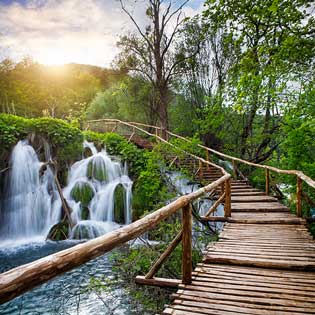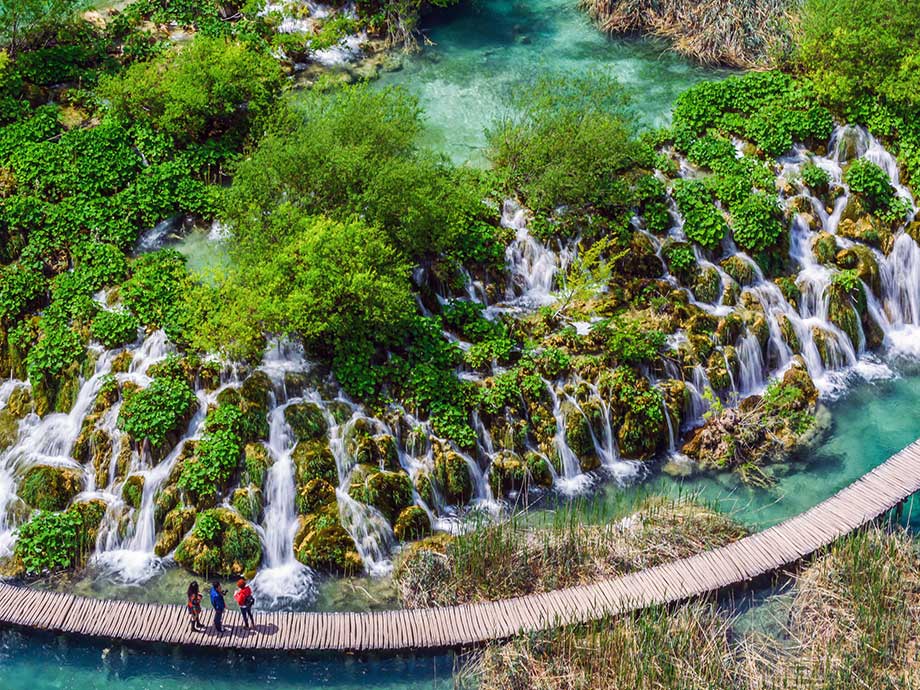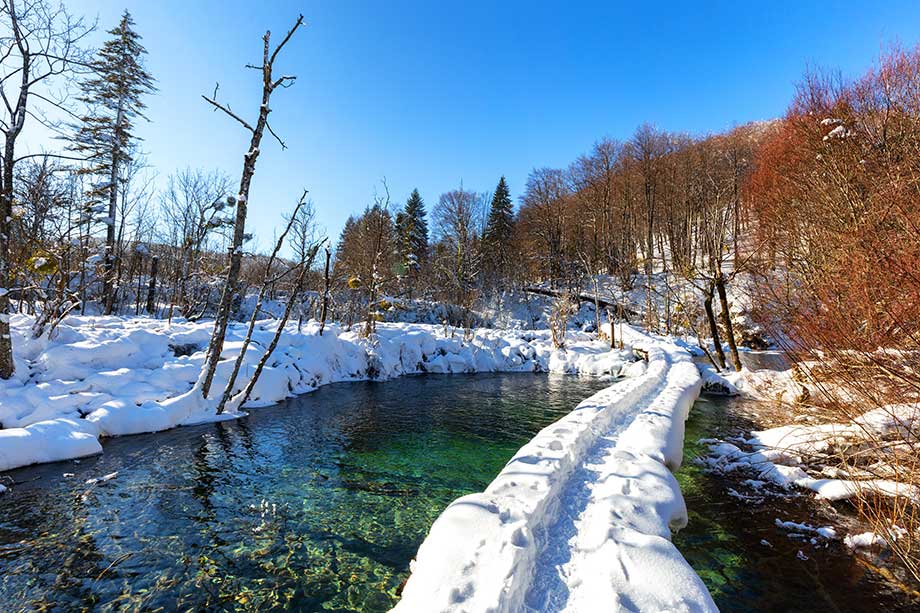Learn some Croatian before you visit Croatia! :-)
Our school offers online group & one-to-one lessons from qualified teachers – from €11/lesson!

Our school offers online group & one-to-one lessons from qualified teachers – from €11/lesson!
Plitvice Lakes (Plitvička jezera) is a Croatian national park which is centred around a chain of 16 lakes which are connected by countless waterfalls – and set in famously beautiful surroundings.
The national park, which is one of Croatia’s most well-known and popular tourist attractions, covers an area of about 300km² and also includes many caves and other highlights.
 Visiting Plitvice Lakes national park
Visiting Plitvice Lakes national park
Plitvice is located in the Lika region of Croatia, which is in central Croatia's rugged karst region, near the Bosnian-Herzegovina border and about 20km from the mountain Plješevica.
The nearest cities to Plitvice are Karlovac (85km) and Zadar (145km) in Croatia, or Bihač (35km) in Bosnia. The easiest ways to get to Plitvice as a visitor are by car or bus.
In acknowledgement of its prominence as one of Europe's most outstanding natural wonders, the Plitvice Lakes were declared to be Croatia's first national park on April 8, 1949, following the end of World War II.
For its "outstanding natural beauty," the park was included on UNESCO World Natural Heritage List in 1979.
Check out our guide to Croatian national parks, which contains information on each park's location, what makes it unique, what you can do during your visit … as well as some Croatian vocabulary to learn and practice if you're interesting in learning some Croatian!
As a national park, Plitvice Lakes entirely lives up to the hype, and really is as impressive as the photos make it seem. As with much of Croatia, the landscape and scenery is breathtaking, and Plitvice is an experience that many visitors will never forget … if they plan their visit right.
Speaking from personal experience, we can confirm that a trip to Plitvice can be a truly magical experience, however we can also confirm (also from personal experience) that the experience can easily be marred by a handful of (easily avoidable) issues that many face when visiting the park.
Be sure to think about the following before planning your visit:
During a historical period of drought, locals petitioned the magical Black Queen for assistance, and she answered by building the Plitvice lakes. The lake Prošćansko Jezero was thought to be her first creation!
On a hot day, the Korana river, which flows through Plitvice Lakes National Park, can be just as appealing as the park itself. To make it easier to swim, villagers have built a small ladder next to a tree just outside the village of Korana.
The majority of visitors to Plitvice visit the park during their summer vacation in July and August. If you have the chance, we recommend paying a visit to the park during the other three seasons.
Depending on how you time your visit you can enjoy the colours of autumn, the wintery touch of snow and ice, or the beginning of a new season in spring. Not to mention that the national park is far quieter at any time other than in the heart of summer.
 Snow in Plitvice Lakes
Snow in Plitvice Lakes
Be sure to look at maps of the park before you set off, or perhaps on your way there: there are 8 official routes through Plitvička Jezera: providing tourists with four alternatives from each of the park's two entrances.
The walking trails are laid out in a figure of eight pattern, circling around the upper and lower lakes. You'll be walking over the waters on a boardwalk for a good amount of any path, which is just wide enough for two individuals to walk side by side comfortably.
During the summer months the park opens each day at 7am, and – if you don't mind making an early start – we strongly suggest arriving at the park as early as you possibly can.
As an "early bird" you'll find it far easier to find a parking space, the air temperatures will be cooler and more pleasant, and you'll be sharing the park with far fewer visitors.
... so, set your alarm clock for as early as you can manage and you'll have a much better day! :-)
The official website of Plitvice National Park
Wikipedia page about the Lika region of Croatia
We’ll be happy to tell you more about our language school and the learning options we offer. Feel free to contact Andrea directly for a chat about any questions you might have!
